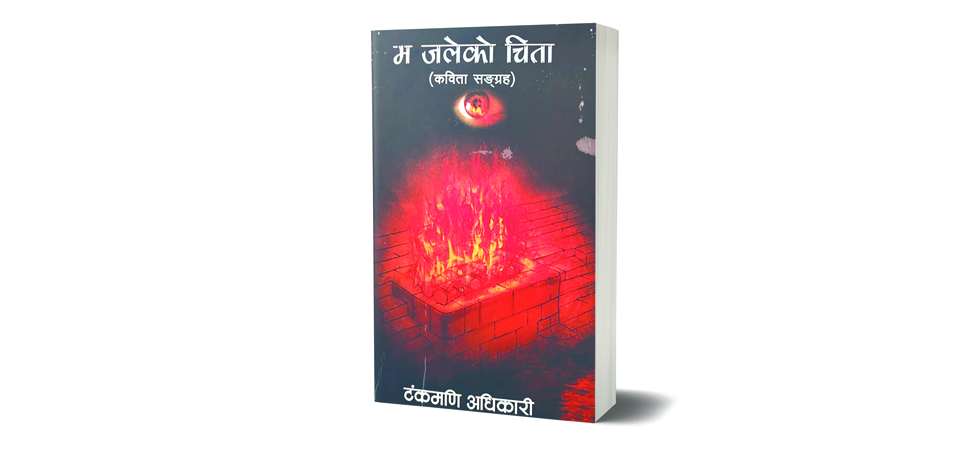Artistically Penned Poems

Gandhi Raj Kafle
Ma Jaleko Chita (The Funeral Pyre Where I Am Burning) is an impressive collection of Nepali poems, where poetry-loving readers can find artistically woven views on a myriad of subjects of our day-to-day life. This collection, which is written for nearly a year, is also impressive even from the point of view of size because it contains sixty-five poems.
However, there is one apparent surprise. This is the first book of poet Tanka Mani Adhikari, which during the poet's journey of life, has rarely appeared in print form. Many of his contemporary creators have already published several poetry collections.
Thus, the surprise in it is: The poet happens to be a person with hidden poetic nature, and all of a sudden, what he realised and felt earnest is he should not do any dilly-dally to tap his potential to write poems in the Nepali language for readers.
And here he is with the reactivated mood after a long slumber, but he is determined and the proof of it is not only words of commitment from him; he has an anthology of sixty-five poems for readers. Thus, this collection is a kind of surprise from him because he has shown he is still young who can do with the ‘only sky is the limit’ ambition to enrich the poetry field of Nepali literature. Is it not also evidence of the ‘age no bar to creativity in literature?
Isn't the title Ma Jaleko Chita (Funeral Pyre Where I’m Burning) that is a bit more aggressive, hard-hitting and bitter or rough to readers, who always love and adore only the beauty of life? All the beauty of life turns to ash and there is only deep sadness after the burning of life in a funeral pyre? Isn't it so? Naturally, the weight of such comments falls on the poetic shoulder of the poet of this anthology.
But, to get appropriate answers to such questions, we have to see some of the pieces of the poet from this anthology itself. Though Tanka Mani Adhikari did not compete to write and publish poems in his young days, it seems, he might have plenty of poetically charged moments in his life, which he must have missed writing.
He has free time after retirement from government service to compose poems from the chosen themes or experiences of life. The foundation, which he has laid already, is this collection and he is full of energy to compose poems in the mature age of his life.
Let’s see how poetically recharged is the poet in furnishing answers to the queries related to life. He writes:
Only the hurt knows
How wound torments
Like a matchstick knows nothing
What is burning with fire
It only burns
With the fire maker’s erroneous action
(Page 91, poem tile: Aek Kanti Salai)
Similarly, also see a few lines of the book title piece of the poem:
See, all of my bad characters burnt
Ill-feelings burnt into ash
My lust, anger and greed all
Burnt gradually
My heart became burden-free
(From Poem Ma Jaleko Chita, Page 97)
Or, let’s also read a few lines of the poem below for the evidence of patriotic feelings in the poet:
With one step in the bank of Mechi River
And, other in Limpiyadhura
It gives water, sees the World
It saves the life of living beings incessantly
It is the World’s tallest head
Magnanimous Sagarmatha!
(From the poem Sagarmatha, Page 211)
A few lines mentioned above from each of the three important poems of the poet in this collection testify Adhikari’s mature views on the art of poetry.
But, to remember, the poet of this book is not limited to only the prominent issues of life or society or the nation, he is equally concerned even by the mundane issues of life also.
There are proofs like this in this anthology. Art as poetry requires rich feelings and experiences in the mind and soul of the creator. How is Adhikari about this aspect of life? He is a unionist also, which means he knows what labourers’ issues mean in a society like ours.
He hails from the eastern hill region of Bhojpur District and the local dialect of that part from the viewpoint of the Nepali language is his special asset.
However, in this background what also needs to be added about him is that he has been a life-long admirer of Nepali poetry and his skills and talent in proof-readings of the Nepali texts are known facts. So, poetry to him is not a new thing. It can’t squeeze him just because he wrote only a little.
He can write and he has tremendous potential to do it and this is not raw praise to him; this under review anthology of poetry itself speaks a lot about it. Thus, we can say poet Adhikari’s mature age and his free time after retirement will not be silent from the viewpoint of poetical creativity.
Recent News

Do not make expressions casting dout on election: EC
14 Apr, 2022
CM Bhatta says may New Year 2079 BS inspire positive thinking
14 Apr, 2022
Three new cases, 44 recoveries in 24 hours
14 Apr, 2022
689 climbers of 84 teams so far acquire permits for climbing various peaks this spring season
14 Apr, 2022
How the rising cost of living crisis is impacting Nepal
14 Apr, 2022
US military confirms an interstellar meteor collided with Earth
14 Apr, 2022
Valneva Covid vaccine approved for use in UK
14 Apr, 2022
Chair Prachanda highlights need of unity among Maoist, Communist forces
14 Apr, 2022
Ranbir Kapoor and Alia Bhatt: Bollywood toasts star couple on wedding
14 Apr, 2022
President Bhandari confers decorations (Photo Feature)
14 Apr, 2022










